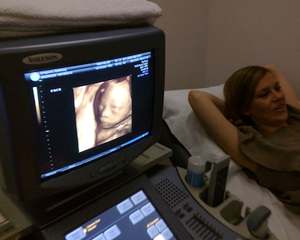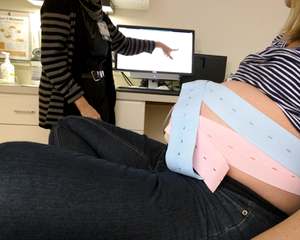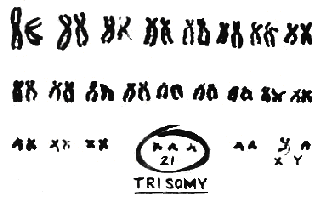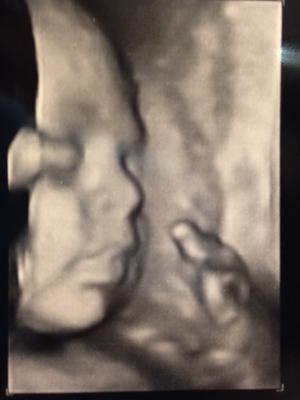When the ultrasound news isn’t what you expect
It’s a treat for expectant parents, the 20-week ultrasound. It’s when you find out the child’s gender.
There can also be a different kind of news. At around 20 weeks is when fetal issues begin to appear. Each year, too many penchant parents hear, “We found something.”
At our 20-week ultrasound, we learned our second child was a boy! Then we heard, “soft markers.”
Soft markers don’t sound good
I’m no medical expert. The term soft markers left me feeling uneasy. Of course, the ultrasound technician explained what it meant. Still, I walked away with the phrase soft markers. Trying to disarm it.
In truth, soft markers don’t always mean there’s a problem. About 1 in 30 babies will have one. Most babies are born without issues. Soft markers get attention because they’re an indicator for Down syndrome.
Soft markers can go away. We prayed the would for our son. Also, we felt maybe they meant something.
Our son’s soft markers

The posterior nuchal fold is at the back of the head. The ultrasound tech measures the distance between the neck bold and the fold of skin. A thicker reading goes along with chromosomal abnormalities. It’s not a sure thing, though.
We were told, most babies have a high reading with no issue. At the same time, the indicator can double your risk factor. In the scientific world, going from 1% to 2% risk is a big deal.
Our baby didn’t need to pass a test
We didn’t pursue genetic testing. It’s clearly a great thing. Many parents use it without question. For us, it was an unnecessary step. We were committed to our son regardless of the outcome. We would learn all about him at birth. Waiting until this happened, the news would be 100% accurate as well.
Then at 28 weeks, the OB/GYN brought my wife back in. It was for another ultrasound. The baby’s weight and size were recorded. At that time, more markers were found. The OB related the news in tears.
Our son had a heart abnormality and a gastrointestinal issue. He was also undersized.
Getting concrete answers

My wife’s doctor wasn’t concerned for our son’s life. Surgery could fix his issues. The ultrasound had revealed abnormalities that point to Down syndrome.
The heart issue was an A/V canal defect. The gastrointestinal problem was duodenal atresia. (A “double bubble” in the stomach.) Our doctor explained there were two ways to verify the diagnosis. One was through amniocentesis. It was an older method with some possible risks to the fetus.
Safer was a blood test that analyzed fetal DNA within the mother’s blood. It was percentage points less sure but more common today.
Trisomy-21
Even before the test result arrived, we were ready. Our son had Down syndrome.
The scientific term is Trisomy-21. Our son had three of the 21st chromosome. What did that mean?
The average person has 46 chromosomes. When a baby is formed, 23 pairs are supposed to divide, one from each parent. In some cases, the 21st chromosome doesn’t divide. One parent delivers two. Add the chromosome from the other parent, you get three total.
Three chromosomes lead to an “over-expression” of genetic information. DNA in the 21st chromosome does too much. It leads to a number of complications. Why it’s referred to as a syndrome.
The Down part
“Down” is not a label for people with Trisomy-21. It isn’t a synonym for slow or dumb. John Langdon Down was a researcher who discovered the syndrome. His surname Down is simply a bad coincidence. It appears to be a label.
Since it’s customary to name medical issues after the doctors who discover them, we have Down syndrome. Before Dr. Down, doctors grouped together a variety of cognitive and birth afflictions. Dr. Down identified a specific kind of birth defect.
In the 19th century, it was normal to institutionalize everyone with genetic issues. Down worked to improve the lives of people with Trisomy-21. Unfortunately, Down also popularized the term Mongoloid for the condition. The term—offensive, inaccurate—was retired by doctors in the 1960s. Somehow, Down’s name was chosen as a replacement!
Few parents think _Down syndrome _is the right term for Trisomy-21.
A more compassionate picture

How much better if Trisomy-21 were called Lejuene syndrome?
Dr. Jerome Lejuene discovered the cause of this genetic abnormality in 1958. A French pediatrician, Lejuene recognized the tripling of the 21st chromosome.
Trisomy = extra copy of a chromosome.
21 = the 21st chromosome.
Or, Trisomy 21.
Dr. Lejuene’s discovery was instrumental. A deep study of the 21st chromosome would begin. Lejuene’s research was used in another way. Fetuses with Trisomy-21 could now be identified and terminated. Dr. Lejuene regretted this outcome. As a staunch Catholic, Lejuene spoke pointedly against abortion for gene abnormalities. (Later, Lejuene believed his anti-abortion views cost him the Nobel prize.)
Our unscientific reaction
I didn’t know about Lejuene. (I would for another few months until I researched this subject tepidly.) But when the diagnosis came to us, we agreed with a French researcher, now deceased.
Our son was our son. Forty-seven chromosomes, or 45, or 46, he would always be our son.
Forty-seven chromosomes, or 45, or 46, he would always be our son.
What hit me harder was a heightened sense of personal responsibility. I knew this diagnosis would test me. it would require me to be a better person. A better father. Our son would need my wife and I needed to be better. We were nervous. It was nerves for what we could for our son. Not for what he couldn’t do for us.


The reality of childbirth
Creating life is an awesome process. It can go in many directions. Yes, there was a moment when we grieved for what our son wouldn’t have. And yet, the feeling was challenged by our faith. Our son was ours but his life wasn’t about us. Our son belonged to God.
We remembered a line from Psalms.
For you formed my inward parts, you knitted me together in my mother's womb Psalm 139: 13
Our son had an extra chromosome. It was how he was made.
Before I formed you in the womb I knew you Jeremiah 1:5
What to doctors looked like an anomaly or a mistake was a plan. God had a plan.
Many are the plans in the mind of man, but it is the purpose of the LORD that will stand Proverbs 19:21
As parents, we are anxious. Bewildered. Even overwhelmed. And yet, comforted.
Why the diagnosis is hard
Behavioral and Cognitive Symptoms:
- Delayed speech and language development
- Moderate to severe developmental delays
- Cognitive impairment
- Slowed learning
- Below-average intelligence
- Slowed pace of developmental milestones
Possible Physical Symptoms:
- Heart defects
- Sleep apnea
- Seizures
- Hearing loss
- Premature aging
- Visual problems
Source: Boston Children’s Hospital
Not just to manage or cope …
New parents don’t like mysteries. Trisomy-21 is a syndrome with a lot of mystery surrounding it. Experts don’t know how the syndrome will manifest in each child. Most kids struggle with speech. Some will be non-verbal. Others will have hearing problems. Some won’t. Many will need glasses.
The cognitive disability is sometimes large, sometimes small.
It’s all in how the genes over-help. Which genes are involved? No one knows in advance.
We were shaken, but we knew. A diagnosis of Trisomy-21 wasn’t a hopeless thing. Our son will have one extra chromosome. It will make him different in some ways. It will also make him as special as anyone. to hear the experts tell it—parents, doctors, and caregivers—maybe he’d even be a little more special.
… to find joy
Many of you are looking at this from afar. “What a terrible thing.” I wouldn’t take issue with this reaction. I feel the same about others’ hardships. I’m not thinking, hopeless. Only sympathizing.
Others might be reading for information. “What if this happens to us?” If you’re asking this question, you are likely going to fight for your child. In the meantime, the diagnosis weighs heavy. You’ll be looking for joy.
When we heard “Trisomy-21,” here’s what we did.
Didn’t check Google
To start, we wanted to limit the information flow. There are obviously a lot of emotional opinions online. We didn’t want to receive the wrong information that would steal our joy before it began. We chose to live with questions for a while.
Did listen to our doctors
We were fortunate to receive excellent care from every doctor. there were several providers:
- local OB/GYN
- regional ultrasound specialist
- nationally-ranked hospital
Our doctors worked together to share information. They gave us excellent resources and a birth plan.
Didn’t rush the discoveries
We weren’t in a hurry to figure it all out. We knew the basics. Our son would have special needs. We still had months to get used to this news. We took that time to adjust, adapt. We let it all sink in.
Did talk about it together
My wife and I weren’t ready to discuss it publicly. We made a point of talking about it together, often. It felt right to keep communication open but voluntary between us. We gave each other space to reveal our feelings about it. In this way, we came to the same conclusions.
Didn’t think ahead 5-10 years
There are many inspiring stories about kids with Trisomy-21. We weren’t ready. Expecting a special-needs child caused us to have a much shorter focus. We didn’t, couldn’t think ahead. We needed to live one day at a time.
Did pray
Our prayers weren’t just for a miracle of a different diagnosis. We asked for the ability to be capable parents. Our son was facing multiple surgeries at birth. We prayed for his health. For our own strength. We belong to a church. Hundreds of people prayed alongside us. Their faith blessed us in many ways.
Love and support

In time, we read the literature given by the hospital. We looked online, carefully.
A particular YouTube video was positive and uplifting. “Dear Future Mom” is a response to a letter from a concerned mother. The response is read by kids with Trisomy-21. The video shows what matters most.
These kids aren’t an idea. Or a problem. They’re people and they love life.
One day at a time
Regardless of what comes, we’re thankful. We know who made us. We know who made our son. Day-to-day life will always be uncertain. We can approach it with hope. Joy is possible, even when life gets big.
What’s helped our family, so far, is a mixture of things. Trusting, learning, and also taking it all slowly. Back in August, we had no idea what was coming. Now, we can sense that it’s a plan bigger than ourselves. We’re ready to live God’s plan with our son. (Go here for news about his wonderful birth!)
Leave a comment below
Maybe you have Trisomy-21 in your lives. Perhaps it’s another health issue. We’re encouraged by stories from other families. Let us know how you’ve found joy within it. Or how you’re keeping it!
All photos © Eugene Havens





